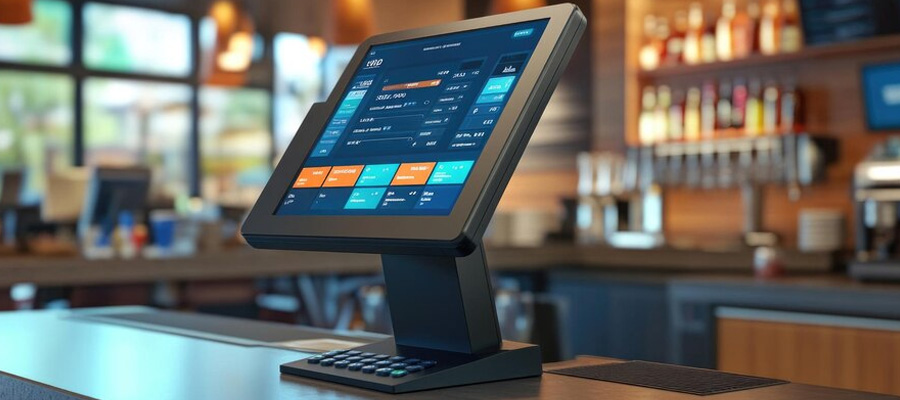
Top Benefits of Cloud-Based POS Systems for Modern Businesses
Tired of old-school cash registers? Cloud-based POS systems are the new cool! These systems aren't tied to one place, like a regular computer. They work from anywhere you have the internet! Here are some of the key benefits of adopting a cloud-based POS system.
Key Benefits Of Adopting A Cloud-Based Pos System
1. Accessibility and Flexibility
One of the primary benefits of cloud-based POS systems is their accessibility. Because these systems are hosted in the cloud, they can be accessed from any device with an internet connection.
-
Remote Management: Business owners can manage their operations from anywhere, whether at home, on the go, or from multiple store locations.
-
Multi-Device Compatibility: Cloud-based POS systems work on various devices, including tablets, smartphones, and desktop computers, providing flexibility in how businesses operate.
2. Real-Time Data and Analytics
Cloud-based POS systems offer real-time data access, allowing businesses to monitor sales, inventory, and customer behaviour instantly.
-
Real-Time Reporting: Gain insights into sales trends, inventory levels, and customer preferences without waiting for end-of-day reports.
-
Data-Driven Decisions: Use real-time data to make informed decisions, such as restocking popular items or adjusting marketing strategies.
3. Cost-Effectiveness
Implementing a cloud-based POS system can be more cost-effective than traditional POS systems.
-
Lower Upfront Costs: Traditional POS systems often require a significant upfront investment in hardware and software. In contrast, cloud-based systems typically have lower initial costs and offer subscription-based pricing.
-
Reduced Maintenance: Since the software is hosted in the cloud, maintenance and updates are handled by the service provider, reducing the need for in-house IT support.
4. Scalability
Cloud-based POS systems are highly scalable, making them ideal for businesses of all sizes, from small shops to large chains.
-
Easily Add Locations: Expand your business by adding new locations without the need for extensive hardware installations.
-
Grow with Your Business: As your business grows, you can easily upgrade your cloud-based POS system to include additional features and capabilities.
5. Enhanced Security
Security is a critical concern for any business handling customer transactions. Cloud-based POS systems offer robust security measures to protect sensitive data.
-
Data Encryption: Customer and transaction data is encrypted during transmission and storage, reducing the risk of data breaches.
-
Automatic Backups: Cloud-based systems automatically back up data, ensuring that it can be recovered in case of hardware failure or other issues.
6. Integration with Other Systems
Cloud-based POS systems can integrate seamlessly with other business applications and tools.
-
Accounting Software: Sync with accounting software to streamline financial management and reporting.
-
E-commerce Platforms: Integrate with e-commerce platforms to unify online and in-store sales, providing a cohesive shopping experience for customers.
7. Improved Customer Experience
Cloud-based POS systems can enhance the customer experience by offering faster and more efficient service.
-
Quick Transactions: Speed up the checkout process with intuitive interfaces and quick payment processing.
-
Loyalty Programs: Implement and manage customer loyalty programs more effectively, rewarding repeat customers and encouraging loyalty.
Cloud-Based POS Systems for Retail and Restaurants
1. Retail
For retail businesses, cloud-based POS systems offer several specific benefits:
-
Inventory Management: Track inventory levels in real-time and receive alerts when stock is low.
-
Sales Insights: Analyze sales data to identify trends and make data-driven merchandising decisions.
-
Customer Management: Maintain detailed customer profiles to personalize marketing and improve customer retention.
2. Restaurants
In the restaurant industry, cloud-based POS systems streamline operations and improve service quality:
-
Order Management: Take orders on tablets or mobile devices, sending them directly to the kitchen to reduce errors and speed up service.
-
Table Management: Manage table reservations and seating arrangements efficiently.
-
Staff Scheduling: Simplify staff scheduling and track employee hours with integrated timekeeping features.
Cloud-Based POS vs. Traditional POS
When comparing cloud-based POS systems to traditional POS systems, several key differences stand out:
-
Deployment: Traditional POS systems require on-site hardware and software installation, while cloud-based systems can be deployed quickly with minimal hardware requirements.
-
Maintenance: Traditional systems need regular maintenance and updates, often requiring IT support. Cloud-based systems are maintained by the provider, ensuring they are always up-to-date.
-
Cost: Traditional systems have higher upfront costs, while cloud-based systems offer subscription-based pricing, which can be more manageable for small businesses.
Transitioning to Cloud-Based POS Systems
Transitioning to a cloud-based POS system can be a game-changer for businesses. While it's awesome to have all those new features, making the change isn't always a walk in the park. You'll need a plan to make sure everything goes smoothly and you get the most out of your new system.
1. Assessing Business Needs
Before making the switch, businesses should thoroughly assess their needs and objectives. Consider the following:
-
Business Size and Scope: Determine whether your business needs a basic POS system or a more comprehensive solution with advanced features.
-
Current Challenges: Identify pain points with your current POS system, such as maintenance costs, data accessibility, or scalability issues.
-
Future Goals: Consider long-term goals, such as expanding to multiple locations, enhancing customer loyalty programs, or integrating with e-commerce platforms.
2. Choosing the Right Provider
Selecting the right cloud-based POS provider is crucial. Look for providers that offer:
-
Comprehensive Features: Ensure the POS system includes all necessary features, such as inventory management, sales reporting, customer management, and integration capabilities.
-
Scalability: Choose a provider whose system can grow with your business, adding new locations or features as needed.
-
Support and Training: Reliable customer support and training resources are essential for a smooth transition and ongoing operation.
3. Data Migration and Integration
Migrating data from a traditional POS system to a cloud-based one can be complex. Effective data migration involves:
-
Data Cleaning: Ensure that all existing data is accurate and up-to-date before migration.
-
Mapping Data: Identify how data from the old system will map to the new one, including customer records, inventory, and sales data.
-
Testing: Perform thorough testing to ensure data integrity and functionality in the new system.
Integration with other business systems is also key. Cloud-based POS systems should seamlessly connect with:
-
Accounting Software: Syncing sales data with accounting software for accurate financial management.
-
E-commerce Platforms: Unifying online and in-store sales channels for consistent customer experiences and centralized inventory management.
-
Customer Relationship Management (CRM) Systems: Integrating with CRM systems to enhance customer data management and marketing efforts.
4. Training and Implementation
Proper training ensures that staff can effectively use the new system. Consider:
-
Comprehensive Training Programs: Providers often offer training sessions, online tutorials, and documentation to help staff learn the new system.
-
Phased Implementation: Implementing the new system in phases can help identify and resolve issues before a full rollout.
-
Ongoing Support: Ensure ongoing support is available to address any questions or issues that arise post-implementation.
5. Monitoring and Optimization
Once the cloud-based POS system is operational, continuous monitoring and optimization are essential to maximize its benefits:
-
Regular Audits: Conduct regular audits to ensure data accuracy and system functionality.
-
Feedback Loop: Collect feedback from staff and customers to identify areas for improvement.
-
Updates and Enhancements: Stay updated with new features and enhancements offered by the POS provider to continuously improve system performance and capabilities.
Real-World Examples
Several businesses have successfully transitioned to cloud-based POS systems, showcasing the tangible benefits of this technology.
1. Retail Success Story
A small retail chain faced challenges with inventory management and reporting using its traditional POS system. By switching to a cloud-based POS system, the business achieved:
-
Real-Time Inventory Tracking: The ability to track inventory across multiple locations in real-time, reducing stockouts and overstock situations.
-
Enhanced Reporting: Access to detailed sales and inventory reports that enabled data-driven decision-making.
-
Scalability: Seamless addition of new store locations without significant IT investment.
2. Restaurant Transformation
A mid-sized restaurant chain improved its operational efficiency and customer experience by adopting a cloud-based POS system:
-
Efficient Order Management: Mobile devices allowed waitstaff to take orders and process payments tableside, speeding up service and reducing errors.
-
Centralized Data: Managers could access sales and performance data from all locations in one centralized system, streamlining management and reporting.
-
Improved Customer Experience: Enhanced loyalty programs and personalized marketing efforts based on customer purchase history.
The Future of Cloud-Based POS Systems
The future of cloud-based POS systems is promising, with ongoing advancements that will further enhance their capabilities:
1. Artificial Intelligence (AI) Integration
AI can be integrated into cloud-based POS systems to provide predictive analytics and personalized customer experiences. For example:
-
Sales Forecasting: AI can analyze past sales data to predict future trends, helping businesses optimize inventory and staffing.
-
Customer Insights: AI-driven insights can identify customer preferences and behaviours, enabling personalized marketing and promotions.
2. Internet of Things (IoT) Connectivity
IoT devices can connect with cloud-based POS systems to automate and streamline various processes. Examples include:
-
Smart Shelves: IoT-enabled shelves can automatically update inventory levels and trigger restock alerts.
-
Automated Checkouts: IoT devices can facilitate seamless, contactless checkout experiences for customers.
3. Blockchain Technology
Blockchain can enhance the security and transparency of transactions processed through cloud-based POS systems. Potential benefits include:
-
Secure Transactions: Blockchain technology can provide an immutable record of transactions, reducing the risk of fraud.
-
Supply Chain Transparency: Businesses can use blockchain to track products through the supply chain, ensuring authenticity and reducing counterfeit goods.
Conclusion
Cloud-based POS systems are like having a super smart cash register! They make running a business easier by:
-
Giving you all the info you need, right away.
-
Saving you money on fancy equipment.
-
Keeping your business safe with strong security.
-
And letting you grow without worrying about technology problems.
Cloud-based POS systems offer many benefits, including easy access, real-time data, cost savings, and better security.
It's like having a helpful assistant who's always there to help you make smart decisions for your business!


